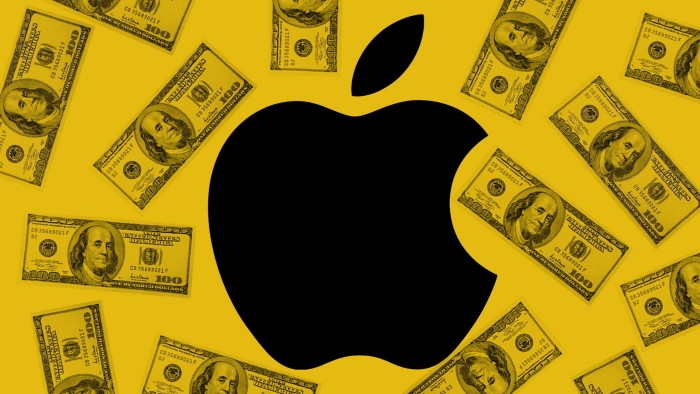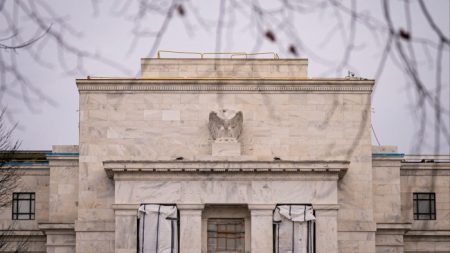Unlock the Editor’s Digest for free
Roula Khalaf, Editor of the FT, selects her favourite stories in this weekly newsletter.
Apple is set to top $100bn in annual revenues from its services business for the first time this year, despite mounting legal and regulatory pressure on its App Store.
The services unit — which includes iCloud, Apple Pay and AppleCare insurance — is expected to deliver annual revenues of $108.6bn in the year to last month, according to analysts’ consensus estimates from Visible Alpha, up around 13 per cent from the year before.
If Apple hits those numbers when it reports its fiscal fourth-quarter results this week, that would make its services division alone larger than the entire annual sales of Walt Disney, Tesla or Tencent this year.
Apple’s high-margin services business, which is primarily overseen by long-serving executive Eddy Cue, has doubled in size over the past five years, making it a vital source of growth at a time when iPhone sales have become less dependable.
Services are on track to make up a quarter of Apple’s revenue but as much as 50 per cent of its profit, said JPMorgan analyst Samik Chatterjee, reflecting the “stickiness” of products such as Apple Pay and recurring payments for iCloud storage.
“Engagement of consumers [is] continuing to increase on iPhones, with growth not only driven by growth in the installed base but also higher monetisation per device,” Chatterjee added.
The unit has also been boosted by a multibillion-dollar deal with Google to make it the default search engine on iPhones and other devices.
That deal was largely spared in September’s US court order following the US Department of Justice’s antitrust victory against Google. The judge’s ruling stopped short of banning Google from sharing advertising revenues with partners, to the huge relief of Apple investors.
But Apple’s own US anti-competition case from the justice department looms over its services business, alongside new regulations in the UK and Europe that could curtail its App Store fees of up to 30 per cent on digital goods purchases.
The US DoJ claims that Apple is using a smartphone monopoly to quash competition and restrict consumer choice, including via its App Store rules, as well as in smart watches and mobile payments.
The tech giant is also still fighting a US legal case brought by Epic Games that seeks to pry open its App Store. The company is appealing an April order when a judge referred Apple to a criminal prosecutor for deliberately thwarting her injunction.
A UK tribunal last week ruled that the US Big Tech group had abused its “near absolute market power” in iOS app distribution and in-app payments, a judgment that could force it to pay out damages of as much as £1.5bn to millions of British consumers. Apple said the ruling was “flawed” and plans to appeal.
The UK competition regulator also said last week it will place Apple’s mobile platform under the oversight of Britain’s tough new digital markets regime, which could force it to allow alternative app stores or new payment systems on the iPhone.
Apple has consistently argued that its tight control of the iPhone’s software and services is vital for customers’ security and privacy, as well as its curation of the App Store and provision of digital tools for developers. The company offers a reduced 15 per cent fee for paid apps and in-app purchases from smaller developers and certain digital subscriptions.
Despite the legal challenges, analysts expect services to make up a larger portion of Apple’s overall business in the coming years, as it expands its media arm into live sports, such as with its recent $700mn deal to stream Formula 1 races in the US, and readies a revamp of its virtual assistant Siri.
Services are forecast to make up more than 30 per cent of Apple’s revenues by the end of the decade, when the unit’s sales could be as much as $175bn, according to Visible Alpha estimates.
By comparison, the iPhone makes up around half of Apple’s expected $415bn in total annual sales in its 2025 fiscal year, with smartphone growth expected to be around 4 per cent.
Digital goods and subscriptions command a high profit margin — even more than Apple’s premium-priced hardware. Gross margins for services are expected to hit 75 per cent in the most recent financial year, Visible Alpha data suggests, compared to 40 per cent for the iPhone. That has helped Apple to steadily improve its overall gross margin from 38 per cent in 2020 to around 47 per cent this year.
Read the full article here













